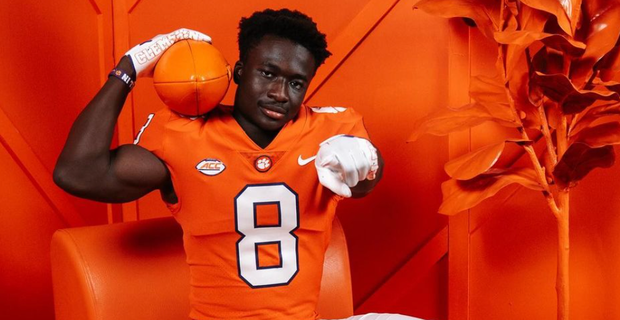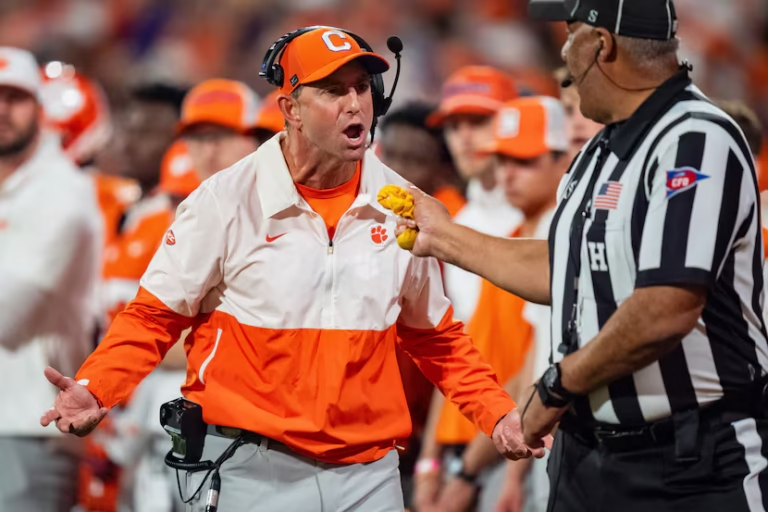
Alabama Switches to the Clemson Tigers: A Look at the Decommitment and the Journey to Clemson,
In the world of college athletics, particularly football, recruiting is a fast-moving and often unpredictable process. Recruits who verbally commit to one school can quickly change their minds and opt to commit to another, sending shockwaves through the college football landscape. This is what happened recently when a highly regarded recruit decommitted from the University of Alabama and switched his commitment to the Clemson Tigers. The decision has drawn significant attention, especially as the recruit chose Clemson over other major programs like Auburn and Kentucky. The move marks not only a shift in the recruit’s future but also has important implications for the recruiting landscape of college football.
The Decommitment: A Shocking Turn of Events
The recruit’s decommitment from Alabama was a significant event. Alabama, under head coach Nick Saban, has long been a powerhouse in college football. The Crimson Tide have consistently dominated the recruiting rankings, pulling in some of the best high school talent year after year. Alabama’s reputation for success, including multiple national championships, has made it a top destination for many high school football stars.
For this recruit, Alabama was the initial choice—a commitment that appeared to be set in stone. However, after careful consideration and discussions with his family, the recruit made the decision to decommit from Alabama. This decision, while not entirely unheard of, was still surprising due to the strength of Alabama’s program and its consistent presence at the top of college football.
Why the Switch to Clemson?
Clemson’s rise in the college football world over the past decade has been nothing short of remarkable. Under head coach Dabo Swinney, the Tigers have become a perennial powerhouse, consistently competing for national championships and consistently attracting some of the top talent in the country. The program’s success has been built on a foundation of elite recruiting, player development, and a culture of winning. For a recruit to choose Clemson over Alabama, as well as other programs like Auburn and Kentucky, speaks volumes about the Tigers’ appeal and the influence Swinney has in the recruiting process.
One of the key factors in the recruit’s decision to switch to Clemson was likely the program’s stability and success. Clemson’s recent string of dominance, including winning two national championships in 2016 and 2018, has positioned the Tigers as one of the top programs in college football. The appeal of playing for a team that regularly competes for national titles is something that cannot be understated. For many recruits, the chance to play on the biggest stage and compete for championships is a primary motivator, and Clemson offers that opportunity in spades.
Additionally, Clemson’s coaching staff, led by Swinney, has earned a reputation for developing players at a high level. The Tigers are known for their ability to take raw talent and turn it into elite players, as evidenced by the number of Clemson alumni who have gone on to successful careers in the NFL. Swinney’s emphasis on building strong relationships with his players, coupled with his ability to develop them both on and off the field, likely played a significant role in the recruit’s decision.
The Other Contenders: Auburn and Kentucky
While the recruit’s commitment to Clemson was the ultimate choice, the process was not without other serious contenders. Auburn and Kentucky were both heavily involved in the recruit’s decision-making process. Each of these programs brings its own strengths and unique qualities to the table.
Auburn University
Auburn, another powerhouse from the Southeastern Conference (SEC), was seen as one of the top schools in the running. The Tigers have a rich football tradition and play in one of the most competitive conferences in college football. Auburn’s commitment to excellence, coupled with the high-level competition in the SEC, made it a natural option for a recruit seeking top-tier competition and exposure.
Head coach Hugh Freeze, who took over the program in 2023, was working to build a strong culture at Auburn, and his experience as a successful coach in the SEC made the program an attractive option. Freeze’s offensive-minded approach and ability to develop quarterbacks could have been a key selling point for the recruit, especially if he played the quarterback position or had aspirations to play in a high-powered offense.
However, despite Auburn’s appeal, the recruit ultimately felt that Clemson offered the best fit for his goals and aspirations. The stability of the Clemson program, along with its championship pedigree, likely made it an easier decision than Auburn, where the program was in a state of transition under a new head coach.
The University of Kentucky
The University of Kentucky, while not traditionally viewed as a football powerhouse, has made significant strides in recent years. Under head coach Mark Stoops, Kentucky has developed into a consistent contender in the SEC, competing in bowl games and producing high-quality NFL talent. Kentucky’s program is known for its strong defense, solid coaching, and commitment to player development.
For a recruit, the opportunity to contribute to a rising program like Kentucky could be an enticing proposition. However, the allure of playing for a national powerhouse like Clemson, with its history of success and its ability to compete for national championships, was simply too much for the recruit to pass up. Kentucky, while a solid program, did not have the same level of championship pedigree or recruiting cachet as Clemson.
The Impact of the Decision on Clemson
Clemson’s ability to secure this recruit is a testament to the strength of the Tigers’ recruiting efforts. This commitment not only bolsters the Tigers’ depth but also signals that Clemson is continuing to compete at the highest level when it comes to recruiting talent. The Tigers’ ability to land high-caliber players in a competitive recruiting environment is a testament to Swinney’s leadership and the overall appeal of the Clemson program.
This decommitment and switch to Clemson also demonstrates that college football recruiting is an ever-changing landscape. Programs like Alabama, Auburn, and Kentucky—despite their successes and appeal—are still vulnerable to losing top-tier recruits to other programs. In the case of this recruit, it was clear that Clemson had made a lasting impression and had earned his commitment.
The Future of the Recruit
As the recruit prepares to join Clemson, the road ahead is full of possibilities. The Tigers’ system, coaching staff, and tradition of success will provide a strong foundation for the recruit’s development. Clemson’s focus on player development and its track record of producing NFL talent will give the recruit the tools necessary to reach his full potential.
The decision to join Clemson also means the recruit will be part of one of the most exciting programs in college football, surrounded by other elite players who will push him to be the best. If the recruit lives up to his potential, he could be a key part of Clemson’s future success as they continue to compete for national championships in the coming years.
Conclusion
The recruit’s decision to decommit from Alabama and commit to the Clemson Tigers is a significant moment in the college football recruiting world. The shift from one powerhouse program to another speaks to the evolving nature of recruiting and the importance of program stability, coaching staff, and the potential for success. While Auburn and Kentucky were serious contenders, it was Clemson’s championship pedigree and commitment to developing players that ultimately won out. As the recruit embarks on his journey to Clemson, all eyes will be on him as he seeks to make an impact in one of college football’s most prestigious programs.






